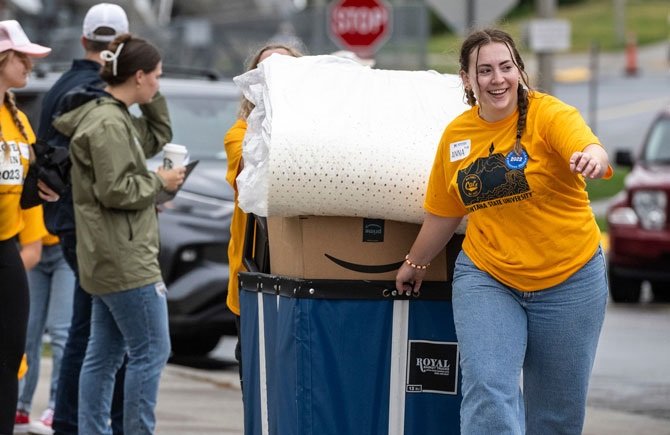By Wendy Morical
The annual Montana State ritual of Move-In Day has been accomplished. Thousands of students, with boxes and crates of possessions, have been moved into their dorm rooms on campus. Driving to Pilgrim on College Street this past Sunday, I passed clusters of young people with family members loading carts to haul belongings into their new homes. Unexpectedly, tears sprang to my eyes as I watched. I’ve been thinking about what may have triggered that emotional response.
Naturally, there’s nostalgia associated with remembering my parents making that trip with me and the enormity of the shift from being a child in my mom and dad’s house to being an adult in Burton Hall. Poignant, too, is the memory of my own children heading off to school and the conflicting, wrenching emotions that accompanied launching them into their independent lives. We all cheered on Sunday to celebrate Quinn’s college adventure beginning this week, but even that spontaneous, joyful moment was tinged with the sadness of losing Quinn.
Transitions, growth, loss, change: essential qualities of our pilgrimage through life. It can feel overwhelming to tally up the things we’ve had to let go of over the course of a season or year. I’ve lost friends to retirement and relocation, family members to illness and infirmity. Our church family has experienced several deaths during the past year. Rather than keep an ever-growing list of sorrows, however, we might remind ourselves that our lives are a journey – the destination both within us and beyond us. To be human is to experience change.
Mindfulness practices, prayer, and healthy maturation help us to focus on what David Whyte calls the “eternal now.” Our existence, a daily gift, and our journey, a series of revelations, comprise our own pilgrim’s journey:
“The great measure of the pilgrim journey of human maturation is the increasing understanding that we move through life in the blink of an eye; that we are not long with the privilege of having eyes to see, ears to hear, a voice with which to speak and arms to put round a loved one; that we are simply passing through. We are creatures made real through contact, meeting and then moving on; creatures who, saying hello and saying goodbye, strangely, never get to choose one above the other.” (Whyte, Consolations, p.186)
My spontaneous tears at witnessing a happy day in the lives of total strangers were a result, I believe, of an elemental awareness of this eternal movement. It’s hard to be human, but God’s goodness and love surround and sustain us at every juncture in our pilgrimage. The miracle is that an ending for us may be another’s beginning – in this life or the next. May we embrace our journeys and give thanks for the revelation of each day.
